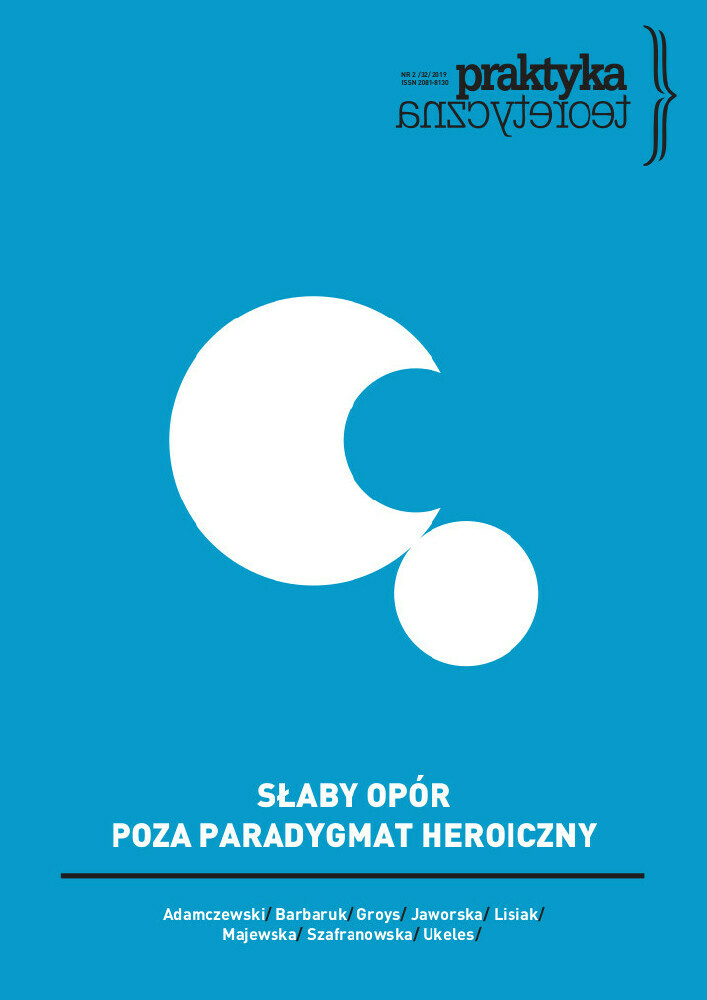Abstrakt
Autor omawia w artykule współczesne osiągnięcia dyskursów ekokrytyki, próbując odczytać je przez pryzmat słabej myśli. Główna uwaga poświęcona jest intrygującym propozycjom teoretycznym Timothy‟ego Mortona dotyczącym hiperobiektów, które ukazane zostają w kontekście OOO (object-oriented ontology), a które uznać można za przykłady innego sposobu uprawiania teorii i praktyki akademickiej. Wykorzystując pojęcie veering (skołowacenia) Nicholasa Royle‟a, autor wskazuje zalety osadzenia rozważań w „osłabionej”, nieantropocentrycznej perspektywie, która stanowi alternatywę dla bardziej dydaktycznych i opartych na poczuciu winy dyskursów krytycznych.Bibliografia
Barry, Peter. 2002. Beginning Theory: An Introduction to Literary and Cultural Theory. Manchester: Manchester University Press.
Bonneuil, Christophe and Jean-Baptiste Fressoz. 2016. The Shock of the Anthropocene: The Earth, Hostory and Us. Trans. David Fernbach. London: Verso.
Buell, Lawrence. 1995. The Environmental Imagination: Thoreau, Nature Writing, and the Formation of American Culture. Cambridge, London: Verso [e-text].
Buell, Lawrence. 2006. The Future of Environmental Criticism. Environmental Crisis and Literary Imagination. Malden–Oxford–Carlton: Blackwell Publishing.
Casarino, Cesare, and Antonio Negri. 2008. In Praise of the Common. A Conversation on Philosophy and Politics. Minneapolis–London: University of Minnesota Press.
Clark, Timothy. 2011. The Cambridge Introduction to Literature and the Environment. Cambridge: Cambridge University Press.
Cohen, Jeffrey Jerome, and Lowell Duckert (eds.). 2017. Veer Ecology – A Companion for Environmental Thinking. Minneapolis–London: University of Minnesota Press.
Colebrook, Claire. 2014. Death of the Posthuman. Essays on Extinction Vol.1. Michigan: Open Humanities Press.
Cuddon, J.A. 1999. The Penguin Dictionary of Literary Terms and Literary Theory. London: Penguin.
Deleuze, Gilles and Félix Guattari. 2004 [1972]. Anti-Oedipus: Capitalism and Schizophrenia. Trans. Robert Hurley, Mark Seem, and Helen R. Lane. London: Continuum.
Deleuze, Gilles and Félix Guattari. 2004 [1980]. A Thousand Plateaus: Capitalism and Schizophrenia. Trans. Brian Massumi. London: Continuum.
Estok, Simon. 2011. Ecocriticism and Shakespeare. Reading Ecophobia. New York: Palgrave Macmillan Garrard, Greg. 2004. Ecocriticism. London–New York: Routledge.
Glotfelty Cheryll, and Harold Fromm (eds.). 1996. The Ecocritical Reader. Landmarks in Literary Ecology. Athens–London: The University of Georgia Press Haraway, Donna J. 2016. Staying with the Trouble. Making Kin in the Chtulucene. Durham–London: Duke University Press.
Harman, Graham. 2002. Tool-Being: Heidegger and the Metaphysics of Objects. Chicago–La Salle: Open Court.
Harman, Graham. 2018. Object-Oriented Ontology. A New Theory of Everything. London: Penguin Random House.
Iovino, Serenella and Serpil Oppermann (eds.). 2014. Material Ecocriticism. Bloomington–Indianapolis: Indiana University Press.
Land, Nick. 2012. The Dark Enlightenment. Retrieved from http://www.thedarkenlightenment.com/the-dark-enlightenment-by-nick-land/ (accessed 08.06.2019).
Lentricchia, Frank, and Thomas McLaughlin (eds.). 1994. Critical terms for literary study. Chicago: University of Chicago Press.
Love, Glen A. 2003. Practical Ecocriticism: Literature, Biology and the Environment. Charlottesville: University of Virginia Press.
Macey, David. 2000. The Penguin Dictionary of Critical Theory. London: Penguin.
Moore, Jason W. 2018. “Anthropocene? More like »Capitalocene«. Interview by Gennaro Avallone and Emanuele Leonard.” In Il manifesto, Global Edition. Retrieved from https://global.ilmanifesto.it/anthropocene-more-like-capitalocene/ (accessed 08.06.2019).
Morton, Timothy. 2007. Ecology without Nature. Rethinking Environmental Aesthetics. Cambridge–London: Harvard University Press.
Morton, Timothy. 2010. Ecological Thought. Cambridge–London: Harvard University Press.
Morton, Timothy. 2013. Hyperobjects. Philosophy and Ecology after the End of the World. Minneapolis–London: University of Minnesota Press.
Morton, Timothy. 2016. Dark Ecology. For a Logic of Future Coexistence. New York: Columbia University Press.
Morton, Timothy. 2017. “Attune.” In Veer Ecology. A Companion for Environmental Thinking. Eds. Jeffrey J. Cohen and Lowell Duckert. Minneapolis–London: University of Minnesota Press.
Morton, Timothy. 2018. Being Ecological. Cambridge: The MIT Press. Nayar, Pramod K. 2010. Contemporary Literary and Cultural Theory: From Structuralism to Ecocriticism. Delhi: Longman/Dorling Kindersley.
Leitch, Vincent B. et al. (eds.). 2001. The Norton Anthology of Theory and Criticism. New York–London: W.W. Norton.
Royle, Nicholas. 2011. Veering. A Theory of Literature. Edinburgh: Edinburgh University Press.
Royle, Nicholas. 2017. “Afterword: On the Veer.” In Veer Ecology. A Companion for Environmental Thinking. Eds. Jeffrey J. Cohen and Lowell Duckert. Minneapolis–London: University of Minnesota Press.
Stoppard, Tom. 2013. Darkside. London: Faber and Faber.
Vattimo, Gianni. 1994. The Transparent Society. Trans. David Webb. Baltimore: John Hopkins University Press.
Licencja
Autorzy:
„Praktyka Teoretyczna” jest pismem, które chce realizować idee wolnego dostępu do wiedzy i poszerzania domeny dobra wspólnego. Ma służyć rozwojowi nauki i krytycznej refleksji w Polsce i na świecie w imię idei wolnego dostępu do wiedzy (Open Access). Całe pismo jest udostępniane za darmo w Internecie na warunkach licencji CC-BY-NC-SA (Uznanie autorstwa-Użycie niekomercyjne-Na tych samych warunkach 4.0 Międzynarodowe) w wersji 4.0 (szczegółowe warunki: http://creativecommons.org/licenses/by-nc-sa/4.0/). Artykuły w nim zamieszczone mogą być dowolnie przechowywane, kopiowane, drukowane, rozpowszechniane i wykorzystywane do celów naukowo-dydaktycznych przy zachowaniu warunków licencji. Apelujemy tylko o uznanie autorstwa i podanie źródła w myśl przyjętych w środowisku naukowym standardów.
Nie ma natomiast możliwości komercyjnego wykorzystania zgromadzonych zasobów bez pisemnej zgody wydawcy. Dostęp do czasopisma nie może być dystrybuowany za opłatą czy w jakikolwiek inny sposób limitowany przez inne podmioty.
Autorzy tekstów przyjętych do publikacji w czasopiśmie „Praktyka Teoretyczna” są zobowiązani do wypełnienia, podpisania i odesłania na adres redakcji umowy o udzielenie nieodpłatnej licencji do utworów, z zobowiązaniem do udzielania sublicencji CC [PL.pdf, PL.doc, EN.pdf, EN.doc].
Zgodnie z umową, autorzy tekstów opublikowanych w czasopiśmie „Praktyka Teoretyczna” udzielają wydawcy czasopisma niewyłącznej i nieodpłatnej licencji oraz zezwalają na użycie sublicencji Creative Commons Uznanie autorstwa-Użycie niekomercyjne-Na tych samych warunkach 4.0 Międzynarodowe (CC-BY-NC-SA 4.0).
Autorzy zachowują prawa do dalszego, swobodnego rozporządzania utworem.
Autorzy nadsyłanych artykułów powinni upewnić się, czy wykorzystywane przez nich materiały nie są chronione prawami autorskimi na rzecz innych osób i ponoszą odpowiedzialność za ewentualne uchybienia w tym względzie.
